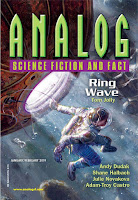
★★☆☆☆ Not Recommended
(Apocalypse) When her species learns that a dark-matter star is going to pull their planet away from their sun, Jade comes up with a desperate plan to deflect it. (9,318 words; Time: 31m)
"A Civilization Dreams of Absolutely Nothing," by Thoraiya Dyer [bio] (edited by Trevor Quachri), appeared in Analog Science Fiction and Fact issue 01-02|19, published on December 15, 2018 by Penny Publications.
Mini-Review (click to view--possible spoilers)
Review: 2019.003 (A Word for Authors)
Pro: The alien culture is quite inventive. I like the creatures who decide every night which memories to keep, and the global mass mind that only operates while people sleep.
Con: The science in this story is really bad, and there’s a lot of it. For example, you can’t “skip” galaxies or solar systems the way you skip rocks in a pond because they don’t have anything holding them together but gravity. The idea that a matter-printer could print dark matter even though the creators knew little about it is hard to credit, but the notion that you could produce the dark-matter equivalent of a person is fantasy, not science. Also, the notion of a habitable planet orbiting so far out that it had a 4-million-day year is ludicrous. Crucially to the plot, it makes no sense that a dark-matter person would have any influence on a stellar-mass lump of dark matter, and the universe would hardly care about that person’s emotions. Finally, it’s not at all clear why there would be a trade-off between ability to store data and ability to compute.
Other Reviews: Search Web
Thoraiya Dyer Info: Interviews, Websites, ISFDB, FreeSFOnline
Follow RSR on Twitter, Facebook, RSS, or E-mail.
Pro: The alien culture is quite inventive. I like the creatures who decide every night which memories to keep, and the global mass mind that only operates while people sleep.
Con: The science in this story is really bad, and there’s a lot of it. For example, you can’t “skip” galaxies or solar systems the way you skip rocks in a pond because they don’t have anything holding them together but gravity. The idea that a matter-printer could print dark matter even though the creators knew little about it is hard to credit, but the notion that you could produce the dark-matter equivalent of a person is fantasy, not science. Also, the notion of a habitable planet orbiting so far out that it had a 4-million-day year is ludicrous. Crucially to the plot, it makes no sense that a dark-matter person would have any influence on a stellar-mass lump of dark matter, and the universe would hardly care about that person’s emotions. Finally, it’s not at all clear why there would be a trade-off between ability to store data and ability to compute.
Other Reviews: Search Web
Thoraiya Dyer Info: Interviews, Websites, ISFDB, FreeSFOnline
Follow RSR on Twitter, Facebook, RSS, or E-mail.
No comments (may contain spoilers):
Post a Comment (comment policy)